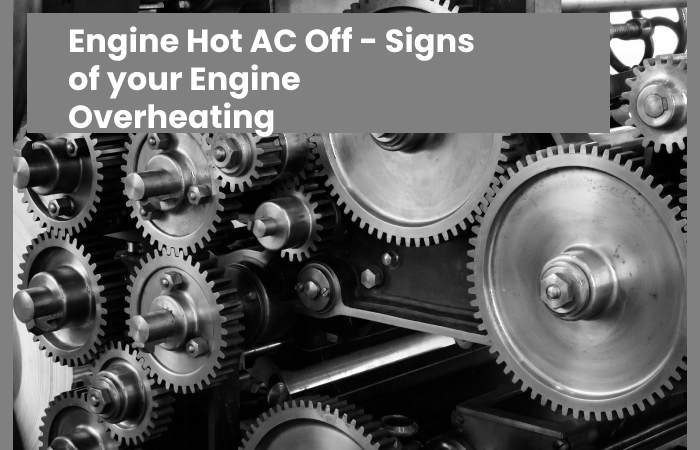Table of Contents
How do Engines Warm Up?
Engine Hot AC Off – Engines can overheat for several reasons. It is due to something wrong with the cooling system and an inability to heat from the engine compartment. The source of the problem may include a leak in the cooling system, a faulty radiator fan, a broken water pump, or a clogged coolant hose.
Regardless of the source of the problem, engine overheating is not something you want to let go of. Your engine can suffer severe, if not permanent, damage.
Engine Hot AC Off – Signs of your Engine Overheating

If you can take steps to cool down your engine before it goes wrong, you can reduce the risk of irreversible engine damage. But first, you should pay attention to the symptoms of a high temperature, which can include:
- Steam (which looks like smoke) comes from under the car’s hood.
- The engine temperature gauge on the dashboard rises to “H” or turns red. (Engine temperature gauge codes vary, so consult your owner’s manual.)
- There is an odd smell coming from the engine area. For example, a leaking coolant may smell sweet, while an oil leak may produce a more burnt smell.
- As soon as you notice the engine overheating, take the following steps and contact your nearest repair shop.
What do you do When your Engine Overheats?
1. Kill the Air Conditioner and Turn Down the Heat
Immediately turn off the air conditioner to reduce pressure on the engine. Then turn the dial to maximum temperature. It can help dissipate the heat to keep the engine from overheating so you can stop somewhere safe. It may sound a little hot, but paying a few minutes of inconvenience is a small price compared to major engine repairs.
2. Find a Safe Place to Pull
Stop and lock the car. Leave the engine to cool down for at least 15 minutes. Check the temperature gauge, as it should return to normal once the engine cools down.
While you wait (and watch the gauge), plan to check your overheating engine. Call a friend, tow truck, or your local Firestone Roadside Support Service for assistance. We will either drive your vehicle to the nearest Firestone Complete Auto Care store or send a trained representative to assist you with step three.
3. Check and Add Coolant (if you have one)
If your coolant level is low, raising the coolant level fast can help protect your engine and prevent overheating until you can fix things. However, this step won’t do much if your coolant hose clogs or the source of your problems is a broken radiator fan or water pump. Consult your owner’s guide to find out the location of your coolant reservoir and how to add coolant to your vehicle.
4. Restart the Engine
If your car hasn’t been towed, it’s time to restart your engine carefully and drive to the nearest auto repair shop. Watch the temperature gauge while driving. If it rises again, stops and allow the system to cool.
Engine Hot AC Off – Ac Engine Off can you Still Drive?
We recommend that you stop immediately on the side of the road to check the condition of the vehicle’s engine. Dealing with engine overheating is not easy, and you should take your car to the garage to check the cooling system. Pay attention to the vehicle overheating, and do not drive too far to cause further damage to the engine. After troubleshooting, ensure the motor and the AC are working correctly. Then you can continue driving without any damage. If you have read so far, are you wondering what caused this phenomenon? Let us move to the next section to know why.
What Causes a Hot Engine to Shut Down?
The main reason for the shutdown of the air conditioning system is the overheating of the car. We can say that you should consider all the reasons for engine overheating when you encounter this phenomenon: the car overheats when the air conditioner is turned off. The cooling system of a car’s internal combustion engine consists of a cooling system and a radiator system. An adequately lubricated motor also reduces friction and helps prevent overheating. Car engine overheating is mainly caused by problems with the above components:
Engine Hot AC Off – Coolant Level
The first reason the engine overheats comes from the coolant. Coolant is pumped out when the engine generates heat, which cools your car’s engine. The hot water is fan-cooled, transferred to the tank, and recycled back to the engine. When the coolant has problems such as leaks, blockages, condensation, or the coolant level is much lower than the standard, it will stop the cooling process, and the car engine will overheat. The result is to turn off the air conditioner at the same time.
The Air Conditioner Compressor Stopped Working
A compressor is an important component of an air conditioning system; without it, your air conditioner cannot function. The responsibility of this part is to convert the refrigerant gas into liquid as it passes through the condenser. When the AC compressor fails.
Engine Hot AC Off – Bad Thermostat Valve
The thermostat is the part of the cooling system responsible for coordinating the coolant. When the engine temperature rises to a certain threshold, the valve will open, allowing fluid to flow to the engine. Therefore, when the thermostat is blocked, coolant will not be distributed to the engine to cool, which will cause the car engine to overheat.
Engine Hot AC Off – Radiator Fan Broken
The heat generated while the engine runs will be discharged into the environment by the cooling system. There is a problem with the cooling fan that does not allow hot air to leak into the engine compartment, causing the engine to overheat.
Coolant Temperature Sensor (ECT) Error
The coolant temperature sensor is also known as the ECT sensor or ETCS (Engine Coolant Temperature Sensor). This sensor is responsible for measuring the temperature of the coolant mixture and sending a signal to the electronic control unit. From there, the ECU adjusts fuel injection timing, turns the radiator fan on or off to help keep the engine running at the proper temperature, etc. When this sensor fails, it causes the cooling fan to operate incorrectly, causing the coolant to not cool and causing the engine to overheat.
Conclusion
Therefore, you can quickly determine why the car is giving the “Hot Shutdown Engine” warning light. If you can identify the reason, you can quickly fix the problem. However, it is one of the most common problems for vehicles. You will face trouble during the long journey and must apply DIY methods to fix it.
HELPFULL RESOURCES:
45 Eth to USD – Introduction, Convert ETH to US Dollar, and More
Marginal Product – Introduction, Formula, Calculation, and More
Mini Fridge – Introduction, Advantages, Instructions, and More
0.35 Eth to USD – Introduction, Convert 0.035 ETH to USD, and, More
Related posts
Featured Posts
S/4HANA Services: Complete Guide
Introduction: The world of technology does not stand still. Business must continue to keep track. Business needs more effective management…
Megakino .com: Your Ultimate Guide to Free Movie Streaming
In the digital age, streaming pictures and television shows have become the go-to entertainment option for millions worldwide. Choosing a…


